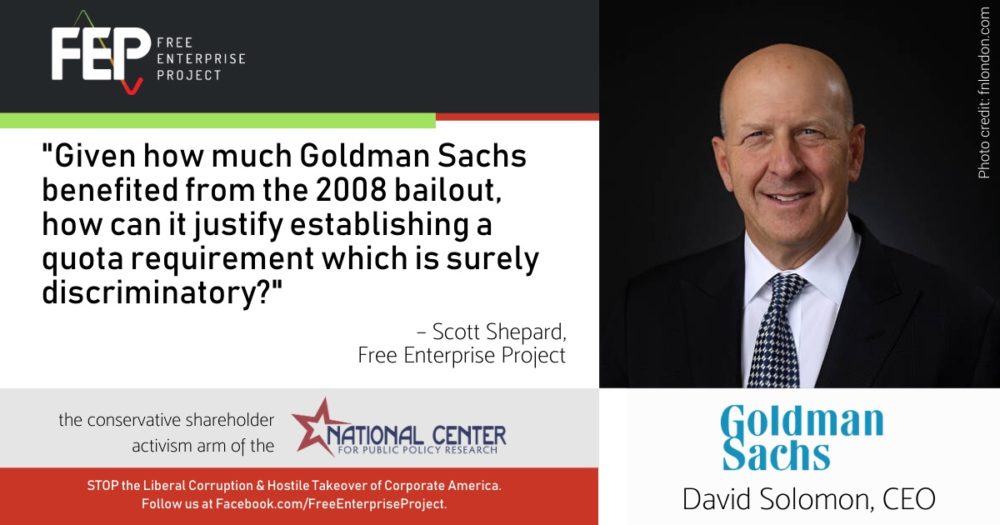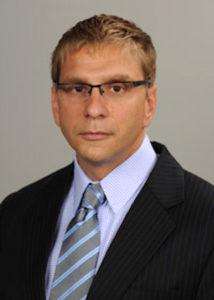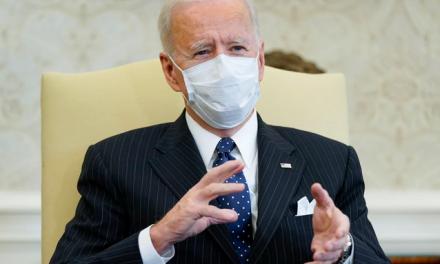LTP News Sharing:
Should Companies That Receive Taxpayer Bailouts Be Allowed to Implement Constitutionally Questionable Policies?
CEO David Solomon Provides Contradictory Messages About Racial Discrimination During Annual Shareholder Meeting
Washington, D.C. – Goldman Sachs CEO David M. Solomon asserted today that requiring firms that the company takes public to include a minimum number of “diverse” candidates on their boards is not a quota, but rather a reason for celebration. Earlier in the meeting, however, Solomon recognized that discrimination on the basis of race and sex is fundamentally unjust and illegitimate, but failed to reconcile this contradiction.
During the company’s virtual annual shareholder meeting, Scott Shepard, Coordinator of the National Center for Public Policy Research’s Free Enterprise Project, asked Solomon:
Goldman is refusing to take companies public unless they have at least one woman on their board of directors. While diversity can be good, the federal government and courts and American opinion have always rejected hard quotas. Given how much Goldman benefited from the 2008 bailout, and how much it and other investment houses have benefited from fiscal and monetary government programs since then, how can it justify establishing a quota requirement which is surely discriminatory and that would likely be ruled unconstitutional if undertaken by the government?
Solomon answered, in part:
We do not view this as a quota. Our objective is to add greater diversity of backgrounds, experiences and opinions to the Board, based on introducing individuals from underrepresented groups, which will openly change the operation and success of the company for the better.
We recognize that diversity has different meanings across different geographies. For the U.S. and Western Europe, we focus on traditionally underrepresented groups in these regions across a various criteria, including gender, race, ethnicity, sexual orientation or gender identity.
Audio of the exchange can be heard here. A written, annotated version of Shepard’s question can be found here.
Scott Shepard
After the meeting, Shepard responded:
For many years now, Goldman Sachs and its leaders have played a very large role in the federal government. Many have argued that this has gone on for too long, and that its role has been too large. These concerns have been exacerbated by the size of the bailouts and subsidies that average American taxpayers have paid to relatively well-off Goldman Sachs – which is to say, primarily to its leaders.
This critique has gone hand-in-hand with the criticism that the American banking system, especially at the top, has become one in which profits are privatized, to the extraordinary benefit of the leaders of that industry, while the losses are socialized, to the detriment of the federal fisc and the federal taxpayer.
It appears that those concerns are well-founded, as Goldman Sachs now appears to have decided that it may act in the combined role of both private legislature and the U.S. Securities and Exchange Commission, determining which companies can go public and which ones cannot, and under which conditions. It has even gone so far as to impose conditions – racial and sex-based quotas for board composition – that would very likely be unconstitutional if enacted by the government.
This sort of brazen behavior threatens Goldman shareholders by practically begging for the government to end the special status of both Goldman Sachs and the banking industry, or to inflict increasing regulation on the sector. This could be very bad for all parties, including shareholders.
Two things about Solomon’s response made it particularly troubling for shareholders. The first is the further demonstration by the CEO that he and Goldman are flying awfully close to the sun. What Goldman has established for companies it takes public is a quota, no more and no less. His blithe assertion that “we don’t see it as a quota” doesn’t change the reality. That he thinks he has this sort of discretionary power over reality should worry shareholders.
The second is that Solomon himself, just minutes earlier, had eviscerated the use of race and sex in business decisions. In response to a separate question about Goldman’s issuance of Apple Cards, Solomon piously assured the questioner that Goldman would never use such factors in granting approval for those cards, as such a basis of analysis would be wrong and illegal. And he’s right. But it’s wrong everywhere, not just in credit-approval decisions. This demonstrated inability to apply basic principles generally and consistently must also worry shareholders.
Today’s Goldman Sachs meeting marks the eleventh time FEP has participated in a shareholder meeting in 2020. To schedule an interview with a member of the Free Enterprise Project on this or other issues, contact Judy Kent at (703) 759-0269.

Click here to support FEP’s efforts to hold corporations accountable!
Launched in 2007, the National Center’s Free Enterprise Project focuses on shareholder activism and the confluence of big government and big business. Over the past four years alone, FEP representatives have participated in over 100 shareholder meetings – advancing free-market ideals about health care, energy, taxes, subsidies, regulations, religious freedom, food policies, media bias, gun rights, workers’ rights and other important public policy issues. As the leading voice for conservative-minded investors, it annually files more than 90 percent of all right-of-center shareholder resolutions. Dozens of liberal organizations, however, annually file more than 95 percent of all policy-oriented shareholder resolutions and continue to exert undue influence over corporate America.
FEP activity has been covered by media outlets including the New York Times, Washington Post, USA Today, Variety, the Associated Press, Bloomberg, Drudge Report, Business Insider, National Public Radio and SiriusXM. FEP’s work was prominently featured in Wall Street Journal writer Kimberley Strassel’s 2016 book The Intimidation Game: How the Left is Silencing Free Speech (Hachette Book Group).
The National Center for Public Policy Research, founded in 1982, is a non-partisan, free-market, independent conservative think-tank. Ninety-four percent of its support comes from individuals, less than four percent from foundations and less than two percent from corporations. It receives over 350,000 individual contributions a year from over 60,000 active recent contributors. Sign up for email updates here. Follow us on Twitter at @FreeEntProject and @NationalCenter for general announcements. To be alerted to upcoming media appearances by National Center staff, follow our media appearances Twitter account at @NCPPRMedia.
The post Goldman Sachs CEO Defends Gender Quotas in Board Selection appeared first on The National Center.
Go to Source
Author: The National Center







